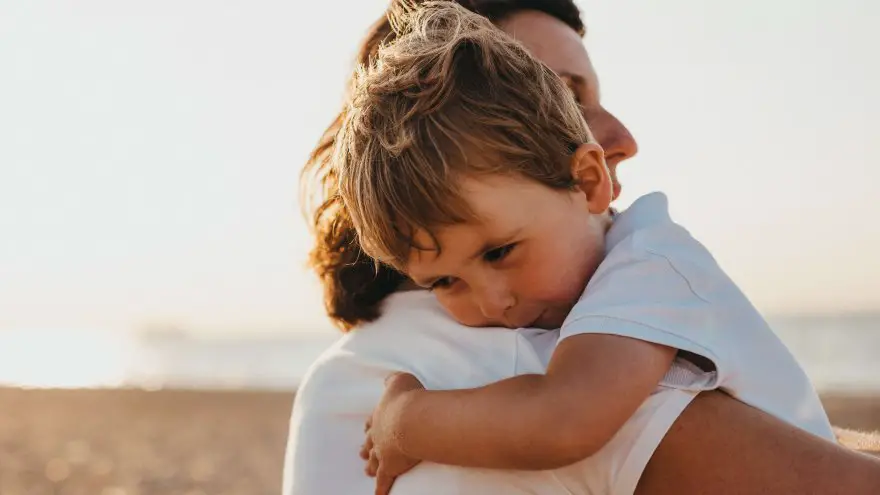Ways your Own Childhood Influences your Parenting

Nothing happens in a vacuum. For every action, there is a reaction, and everything you experienced in your life prior to this moment has made you who you are. You react to things on an emotional level based on prior experiences, lessons learned, and things you were taught morally and socially throughout your life.
There’s a joke that we all grow up and turn into our parents.
It’s a little bit funny, but depending on how your childhood went it might also be a bit unnerving. We all have a few areas where we think our parents were lacking, and the fear that your child will grow up thinking the same of you can be bothersome, even though it’s probably going to happen. Nobody’s perfect right?
How does your childhood affect your parenting? It can actually affect you in a few ways, sometimes more than one. Every family has its own rhythm and culture and the parents often set the tone. Was your house loud growing up? Were you on edge most of the time? Did you feel safe? Was everything up in the air all the time or were routines well established? All of these things can affect how you react to the world around you as an adult, and yes they can even influence your parenting style.
Reactive-response
Stresses you went through as a child can be brought with you into your parenting life. When your child spills their orange juice how do you react? Is it with anger? Frustration? Is this what you experienced when you spilled your orange juice growing up? We often react in the same ways we’ve been taught to. If you aren’t happy with your reactions it can take some time but you can change them.
Proactive-response
Some people vow to never ever be like their parents and swing to the other extreme. If your parents were strict you may become permissive. If your parents were pretty laid back and you got away with more than you thought you should, you may step in and micromanage. Finding a good balance can be difficult, and you may waiver between going too far in one direction and swinging back too far in the other.
Avoidance-response
If in your childhood you had a trauma, you may find yourself attempting to avoid anything that triggers those feelings again, even if the actual thing you’re avoiding isn’t usually traumatic. Getting lost at the mall when you’re young may make you wary of taking your child to crowded places. Learning to cope with long-held anxieties can be difficult but not impossible.
Defensive-response
As much as you may realize that some of the things your parents did work for you, you also realize they may not work for your children because they are completely different people with different needs, wants, and reactions. It can still feel hard to accept that you want to do something different than your parents did, almost like you are being ungrateful to them. Remember that your parents are not on trial and you don’t need to defend them or carry on traditions that you found unhelpful at the time or find unhelpful now. Just because you turned out okay doesn’t mean everything you experienced was okay.
Strategies for success
Introspection; The only true way to deal with issues that cropped up as a child that haunt you as an adult is therapy. Almost everyone has a use for it, so don’t let the stigma get you down. Learning to live with yourself and cope with your feelings will inform you in ways that will help you prevent some of these problems from getting passed down.
Define clear goals for your parenting; make your home into what you wanted and needed as a child. If that means a rule against yelling and a tradition of family feelings meetings do that. Be sure to find ways to encourage everyone to share their frustrations and victories, to build a relationship of trust and safety.
Value security and honesty; Don’t be afraid to admit your flaws, apologize when needed, and step aside when you need a timeout. Validate your children’s feelings, especially when they are frustrated or hurt. Don’t try to minimize them or ignore them. Everyone has the right to feel safe and to be safe. If your child feels safe to be authentic with you it can prevent trouble in the future, but for them to truly feel safe to be open you have to be open with them.
De-escalate when possible; practice mindfulness to help calm your nerves, try not to get into a situation that feels like a zero-sum game. Remember that you are raising someone who is exploring the world for the first time and try not to take it personally when things go wrong. It can be easy to get into power struggles with children, especially if you were raised in a home where might makes right or with the idea that adults can do no wrong. If something happens that makes you feel like you need to react immediately with anger or frustration give yourself room and time to calm down before you make any decisions.
Resist pressure to change your ways; a lot has been learned about parenting and how it affects children since you were a child. This new knowledge and a new way of treating children may seem alien and ineffective to your parents and even your friends. Stick to it, you know what you want for your children and how they are best served. Gentle parenting with reasonable expectations and lots of communication will win out in the end. It’s not always going to be easy, but it will always be worth it.
Being a parent is hard, being a good parent can sometimes feel almost impossible, but if you stick to it, keep being authentic, honestly confront your flaws, and keep your children’s best interest in mind, you will eventually come out on the other side victorious. You are the sum of all the things you experienced in your life, and your children will be as well. Remember that and focus on making those experiences as validating and nurturing as possible.







